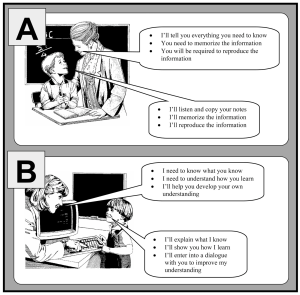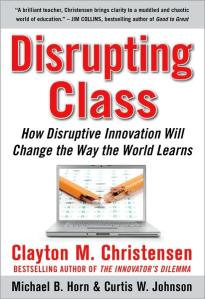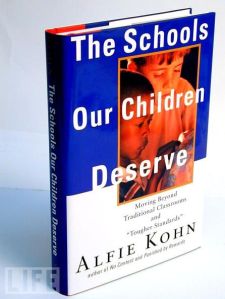The second book I devoured this summer was Alfie Kohn's
The Schools Our Children Deserve. It really challenged my thinking. Although I had always thought of myself as a moderate constructivist, this book gave me pause to think about a lot of the things I still do with my students!
Here are my "sticky-note" sections:
- A preoccupation with achievement is not only different from, but often detrimental to, a focus on learning. (21)
- Meaningful learning does not proceed along a single dimension in such a way that we can nail down the extent of improvement. Measurable outcomes may be the least significant results of learning. (75)
- At best, high test scores for a given school or district are probably meaningless; at worst, they're actually bad news because of the kind of teaching that was done to produce those scores. (91)
- A serious disservice is done to students when they are led to become so preoccupied with how well they're doing that they end up becoming less engaged with what they're doing. (123)
- The evidence suggests that, all things being equal, students in a school that uses no letters or numbers to rate them will be more likely to think deeply, love learning, and tackle more challenging tasks. (189)
- The best way to judge schools is by visiting them and looking for evidence of learning and interest in learning.
- A relatively short period of introducing students to the content and format of the tests may be sufficient to produce scores equivalent to those obtained by students who have spent the entire year in a test-prep curriculum.
I love the way Alfie Kohn gives permission for readers to copy and hand out chapter 4 "Getting Evaluation Wrong: The Case Against Standardized Testing".
Wonder if I'd still have my job in August?
[caption id="attachment_361" align="aligncenter" width="300" caption="Photo via http://jackiegerstein.wikispaces.com"]

[/caption]
The first summer read I picked up was
Disrupting Class by Clayton M. Christensen.
[caption id="attachment_356" align="aligncenter" width="205" caption="Disrupting Class by Christensen"]

[/caption]
Here are some of my favorite "sticky note" ideas from the book (pages I just had to put a sticky note on - a strategy my students use to share their favorite parts of books during the school year):
- "Motivation is the catalyzing ingredient for every successful innovation. The same is true for learning." p. 7
- "The students who succeed in schools do so largely because their intelligence happens to match the dominant paradigm in use in a particular classroom - or somehow they have found ways to adapt to it." p. 35
- How might schools start down the path toward "student-centric classrooms? Computer-based learning! "Student-centric learning opens the door for students to learn in ways that match their intelligence types in the places and at the paces the prefer by combining content in customized sequences." p. 38
- "Larry Cuban...reports that in early-grade elementary school classrooms, computers serve to sustain the traditional early childhood school model. Computers have become just another activity center for children that they can opt to use in the course of the day." He then goes on to talk about the popular drill and practice games that are often played during this computer time commenting that, "As such, computers add cost while failing to revolutionize the classroom experience." pgs. 81/82
- Interesting view, although I'm not sure I agree: "Because student-centric technology allows for far more personalized attention from a teacher, we can do something counterintuitive in education - increase the number of students per live teacher. Facilitatating this disruption of instruction has the potential to break the expensive trade-offs in which school districts have been trapped so that individual teachers can do a better job and give individual attention to more students. As a result, there potentially will be more funds to pay teachers better." p. 107
- In discussing how the age of high-stakes assessment (like the evolution of inspection in industry) has changed a teacher's job, Christensen states that "...at least 80% of the typical teacher's time is now spent in monolithic activity - preparing to teach, actually teaching, and testing an entire class. Far less than 20% is available to help students individually." However when we teach through student-centric online technology, whole group, end of unit exams are not necessary. "...assessment and individualized assistance can be interactively and interdependently woven into the content-delivery stage, rather than tacked on as a test at then end of the process." p. 111
- After mentioning how powerful teachers unions and textbook companies often squash school reform efforts, Christensen states, "...when disruptive innovators begin forming user networks through which professionals and amateurs - students, parents, and teachers - circumvent the existing value chain and instead market their products directly to each other... the balance of power in education will shift." p. 142
Great read, energizing and vindicating!
My husband calls it a teaching addiction. I refer to it as a learning addiction! Why is it, after looking forward to summer break for two (sometimes more!) straight months, we can't stop thinking about our classrooms and our students!
My friends and family think I'm nuts, but I (as well as many other educators) get recharged over the summer by attending workshops, conferences, and reading those most-talked-about books that we just didn't get to read during the school year. I'm not talking about the newest Jodi Picoult or Nicholas Sparks. I ran straight to the public library and checked out Christensen's
Disrupting Class, Kohn's
The Schools Our Children Deserve, and Covey's
The Leader in Me. Yes, I am feeling the recharge coming on!
[caption id="attachment_352" align="aligncenter" width="225" caption="Kohn\'s book about moving beyond traditional classrooms"]

[/caption]
Another great day with Laura Candler. Today we learned about how the Mastery Learning Model and Cooperative Problem Solving can really make a difference in how children understand and master math concepts. Here are my notes using Cover It Live:
PART 1:
The Dynamic Duo - Putting the Punch in Math Instruction
PART 2:
Math Part 2
Click here to view my Cover It Live notes from today's Literacy Workshop with Laura Candler:
Innovative Approaches to Literacy Instruction









